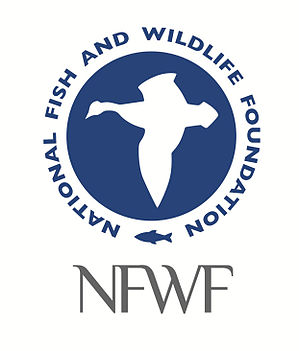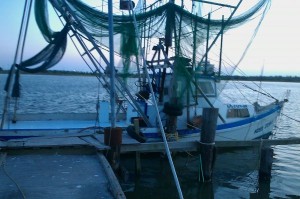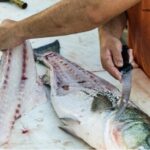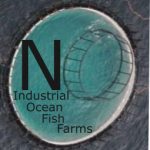Tag Archives: National Fish and Wildlife Foundation
State and federal fisheries concerns addressed at Peltola public meeting
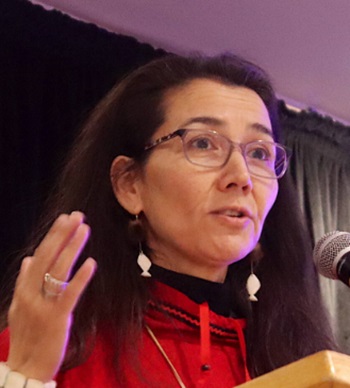 U.S. Rep. Mary Peltola, D-Alaska, held a fish-focused telephone town hall meeting on Thursday, June 20, during which people from across the state voiced concerns related to both state and federal fisheries. Those who called into the meeting, identified by first name only, provided both questions to Peltola and general comments. Callers expressed frustration with what they said were mixed messaging in fisheries management, the lack of understanding among elected officials, and the need for bipartisan work in addressing these issues. H.R. 8508, sponsored by Peltola and two others, authorizes National Oceanic and Atmospheric Administration to reauthorize their Bycatch Reduction and Engineering Program. The bill was referred to the House Committee on Natural Resources in May. more, >>CLICK TO READ<< 09:17
U.S. Rep. Mary Peltola, D-Alaska, held a fish-focused telephone town hall meeting on Thursday, June 20, during which people from across the state voiced concerns related to both state and federal fisheries. Those who called into the meeting, identified by first name only, provided both questions to Peltola and general comments. Callers expressed frustration with what they said were mixed messaging in fisheries management, the lack of understanding among elected officials, and the need for bipartisan work in addressing these issues. H.R. 8508, sponsored by Peltola and two others, authorizes National Oceanic and Atmospheric Administration to reauthorize their Bycatch Reduction and Engineering Program. The bill was referred to the House Committee on Natural Resources in May. more, >>CLICK TO READ<< 09:17
MA Awarded $4.6 Million to Support North Atlantic Right Whale Recovery and Lobster Industry
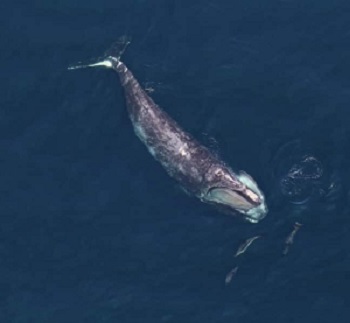 The Massachusetts Department of Fish and Game’s Division of Marine Fisheries (DMF) will receive more than $4.6 million from a congressional appropriation through the Atlantic States Marine Fisheries Commission to enhance the division’s nation-leading
The Massachusetts Department of Fish and Game’s Division of Marine Fisheries (DMF) will receive more than $4.6 million from a congressional appropriation through the Atlantic States Marine Fisheries Commission to enhance the division’s nation-leading

Mass DMF’s On-Demand Fishing Gear Economic Modeling Report Released
The Massachusetts Division of Marine Fisheries (DMF) has completed the second phase of a two-year project, funded by the National Fish and Wildlife Foundation in partnership with the National Oceanic and Atmospheric Administration, to develop the first-of-its-kind evaluation of the operational costs of on-demand fishing gear technology by Massachusetts lobster fishermen. On-demand fishing gear, commonly known as ropeless fishing gear, replaces traditional vertical buoy lines, which can result in entanglements with marine mammals including North Atlantic right whales, with new gear retrieval and marking methods. Most on-demand fishing gear systems consist of submerged buoyancy devices that are activated using time-release mechanisms or acoustic signals transmitted from the surface. Click the links inside for the report. >click to read< 15:47

Massachusetts DMF’s Ropeless Fishing Gear Feasibility Report Released
The Massachusetts Division of Marine Fisheries has completed the first phase of a two-year project, funded by the National Fish and Wildlife Foundation in partnership with the National Oceanic and Atmospheric Administration, to comprehensively characterize the issues and challenges associated with the integration of on-demand fishing gear technology into New England lobster fisheries. On-demand fishing gear, also known as ‘ropeless gear,’ is a type of fishing gear used in ‘fixed gear’ fisheries, or fisheries that use equipment that is left, or ‘fixed’, in place over time to capture fish. On-demand fishing gear replaces traditional vertical buoy lines, which can result in entanglements with marine mammals including North Atlantic right whales, with new gear retrieval and marking methods. >click to read, and access the report< Assessing the Feasibility of On-Demand Gear in New England Lobster Fisheries, 16:40
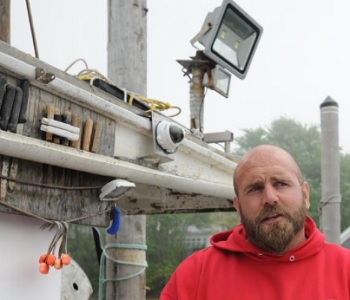
Electronic monitoring long-awaited boon for Cape Cod fishermen
Cape fishermen first started advocating for the use of electronic monitoring in 2006, said Melissa Sanderson, chief operating officer of the Cape Cod Commercial Fishermen’s Alliance. “I would say it’s a long time coming,” said Sanderson of the 14 years it took to finally have approval. But six years ago, Maine fishermen revived interest with their own pilot program and Cape fishermen joined the following year using equipment and technical support provided by The Nature Conservancy and grants from the National Fish and Wildlife Foundation. >click to read< 09:09
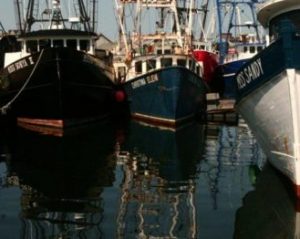
$63.5K to help reshape Gloucester’s fish industry
When the Gloucester Fishing Community Preservation Fund was established in 2007, the Gloucester fleet already had transitioned away from its sizeable offshore groundfish fleet to a largely inshore fleet dependent on cod and other groundfish species in the Gulf of Maine. More than a decade later, the demise of the Gloucester inshore fleet continues, fueled by regulation, environmental restrictions and the simple demographics of an aging and declining workforce. “The aging-out of the fleet and attrition have really taken a toll,” said Vito Giacalone, GFCPF executive director. “We’ve now experienced two generations of fishermen who saw no value in continuing to fish.” >click to read<09:55
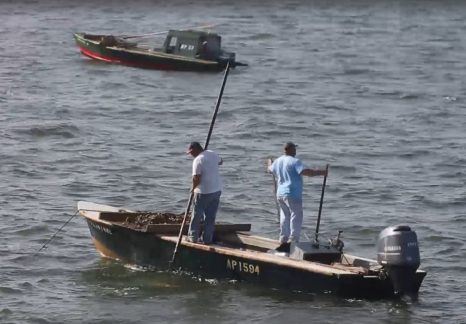
SHELL GAME
Saving Florida’s oysters is a shell game. The right answer is under three domes. Try to follow while the cups whizz by, shifting, swirling. Shell 1: An empty oyster bay. Unemployment. Poverty. But also history. Culture. Shell 2: A slick farming industry that could render the Florida oysterman finally, permanently extinct. Shell 3: The government, doling out money and regulations that might do more harm than good. In a place where everybody’s livelihood is yoked to the water, you have to follow the shells. T.J. Ward was born the year after his grandfather had the throat cancer surgery. T.J. never heard his natural voice. The seaman’s single clap would cut through the salt air on the docks of Apalachicola louder than words could. >click to read<15:00
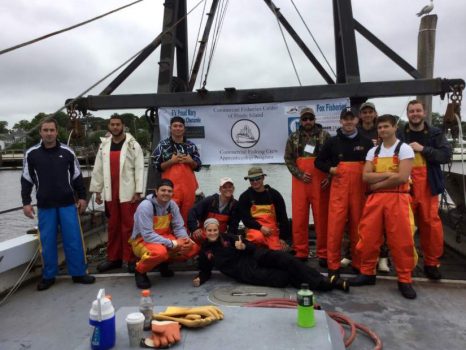
URI, Commercial Fisheries Center combine to create apprentice program in commercial fishing
In early July, a group of apprentices joined a pilot program designed to train new commercial fishermen and women. When the program ended 20 days later, not a single apprentice had dropped out. “We were very pleased with that,” said Barbara Somers, a research associate at the University of Rhode Island’s Department of Fisheries, Animal and Veterinary Science who helped put the program together. “We started with 12 and we ended with 12.” The program, funded by a $100,000 grant from the National Fish and Wildlife Foundation of the National Oceanic and Atmospheric Administration (NOAA), was a joint initiative of URI and the Commercial Fisheries Center of Rhode Island, a non-profit group representing nine fishing organizations. The goal was to produce skilled crews to replenish the declining ranks of the Rhode Island commercial fishery. click here to read the story 08:26
Anyone that supports this should be forced to lick the skidmarks out of Fred Krupps Dirty skiveys
 Vitter: Gulf Council Considers Red Snapper Allocation Pushed by NY Based Environmental Activist Group. The amendment today is endorsed by the New York based Environmental Defense Fund (EDF). EDF has received a $225,959 Fisheries Innovation Fund grant from the National Fish and Wildlife Foundation. This grant program is primarily funded by the National Oceanic and Atmospheric Administration (NOAA), the Walton Family Foundation, and the Gordon and Betty Moore Foundation. Read more here 22:25
Vitter: Gulf Council Considers Red Snapper Allocation Pushed by NY Based Environmental Activist Group. The amendment today is endorsed by the New York based Environmental Defense Fund (EDF). EDF has received a $225,959 Fisheries Innovation Fund grant from the National Fish and Wildlife Foundation. This grant program is primarily funded by the National Oceanic and Atmospheric Administration (NOAA), the Walton Family Foundation, and the Gordon and Betty Moore Foundation. Read more here 22:25
University of New Orleans gets grant to improve turtle excluder devices
UNO researchers will use the funds to enhance the design, test and implement the device which helps a captured sea turtle escape when caught in a fishing net. Read more here 12:35
Fishermen haul up other deadliest catch
 PROVINCETOWN — Fishing vessel crews from the All In and Miss Lilly pulled in at around 2 p.m. Tuesday to MacMillan Pier from a morning of “ghost” busting. Both boats were loaded with old fishing gear, known as “ghost gear,” that the fishermen had scraped up from the sea floor, in the third annual effort to return lobster traps to owners and rid the sea of junk. Read more here 04:07
PROVINCETOWN — Fishing vessel crews from the All In and Miss Lilly pulled in at around 2 p.m. Tuesday to MacMillan Pier from a morning of “ghost” busting. Both boats were loaded with old fishing gear, known as “ghost gear,” that the fishermen had scraped up from the sea floor, in the third annual effort to return lobster traps to owners and rid the sea of junk. Read more here 04:07
Gulf Oystermen Harvest Support from D.C. Legislators and Organizations
 Over the course of four days, the oystermen met with more than 20 Congressmen or staff, as well as with the House Transportation Committee, the Food and Drug Administration, the Senate Labor Appropriations Subcommittee, the National Fish and Wildlife Foundation, the U.S. Department of Agriculture and the National Oceanic and Atmospheric Administration‘s new head of fisheries Eileen Sorbeck. Read more here 13:14
Over the course of four days, the oystermen met with more than 20 Congressmen or staff, as well as with the House Transportation Committee, the Food and Drug Administration, the Senate Labor Appropriations Subcommittee, the National Fish and Wildlife Foundation, the U.S. Department of Agriculture and the National Oceanic and Atmospheric Administration‘s new head of fisheries Eileen Sorbeck. Read more here 13:14
Walton Family Foundation Dumped $91.4 Million Into Greenwashing in 2012: Walmarting the Rivers and Oceans
 Walmart has been in the headlines in recent weeks after the retailer announced plans to keep its stores open this Thanksgiving, forcing Walmart employees to cancel many of their holiday plans. Walmart, the country’s largest retailer and employer, makes more than $17 billion in profits annually, so it has a lot of money to dump into “environmental” groups that serve its agenda of privatization of the public trust. The wealth of the Walton family totals over $144.7 billion – equal to that of 42% of Americans. must read [email protected] 17:22
Walmart has been in the headlines in recent weeks after the retailer announced plans to keep its stores open this Thanksgiving, forcing Walmart employees to cancel many of their holiday plans. Walmart, the country’s largest retailer and employer, makes more than $17 billion in profits annually, so it has a lot of money to dump into “environmental” groups that serve its agenda of privatization of the public trust. The wealth of the Walton family totals over $144.7 billion – equal to that of 42% of Americans. must read [email protected] 17:22
Commercial Fishing, conference center on the City of Monterey council agenda
The council will hear the results of a 2012 grant-financed study on the sustainability of commercial fishing in Monterey . The city and Morro Bay were awarded such grants by the National Fish and Wildlife Foundation. The report concludes local commercial fishing not only has a future, but it can be protected, stabilized and expanded by taking several key actions. They include improving wharf infrastructure and supporting development of a community quota fund for the groundfish fishery. more@mercurynews 11:59
. The city and Morro Bay were awarded such grants by the National Fish and Wildlife Foundation. The report concludes local commercial fishing not only has a future, but it can be protected, stabilized and expanded by taking several key actions. They include improving wharf infrastructure and supporting development of a community quota fund for the groundfish fishery. more@mercurynews 11:59
Homer-based North Pacific Fisheries Association has received a $147,400 NFW Foundation grant to use electronic monitoring
Homer-based North Pacific Fisheries Association has received a $147,400 National Fish and Wildlife Foundation Fisheries Innovation Fund grant for a two-year project to use electronic monitoring in the pot and longline cod fisheries. National Marine Fisheries Service is providing another $120,000 in matching funds. NPFA president Buck Laukitis said the focus would be on the small boat cod fleet. The grant was awarded while NPFA was wrapping up a similar grant project for smaller halibut boats. continued
Mote Receives National Fish and Wildlife Foundation Grant Money to Bring Electronic Monitoring of Fisheries to Gulf (Way too intrusive)
Mote Marine Laboratory announced it has received a $150,000 grant from the National Fish and Wildlife Foundation (NFWF) to establish the first center for electronic monitoring of commercial fisheries in the Gulf of Mexico. Mote officials say it’s a first step toward gathering more scientifically sound data to inform fisheries management in the entire Gulf. continued
New Program Aims to Reduce Offshore Fishing Debris
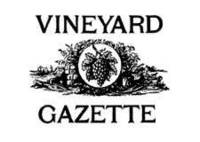 Lynne Fraker, a Vineyard Haven fisherman and member of the Martha’s Vineyard/Dukes County Fishermen’s Association, led the effort to bring the program to the Vineyard late last summer . “I realized there was a need . . . I knew there was a program on the Cape. I knew it was successful and it didn’t cost anything,” she said. Read more here
Lynne Fraker, a Vineyard Haven fisherman and member of the Martha’s Vineyard/Dukes County Fishermen’s Association, led the effort to bring the program to the Vineyard late last summer . “I realized there was a need . . . I knew there was a program on the Cape. I knew it was successful and it didn’t cost anything,” she said. Read more here






